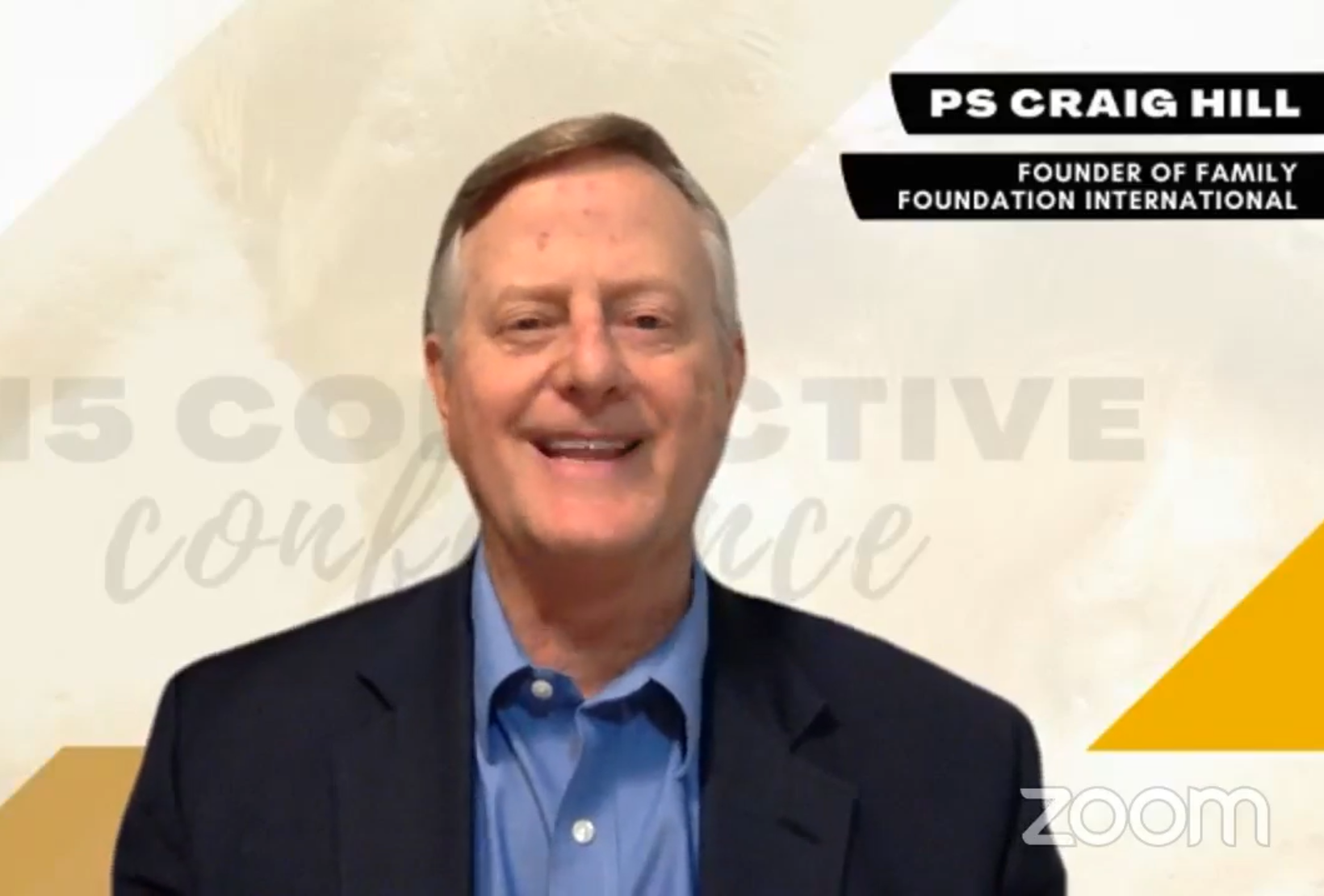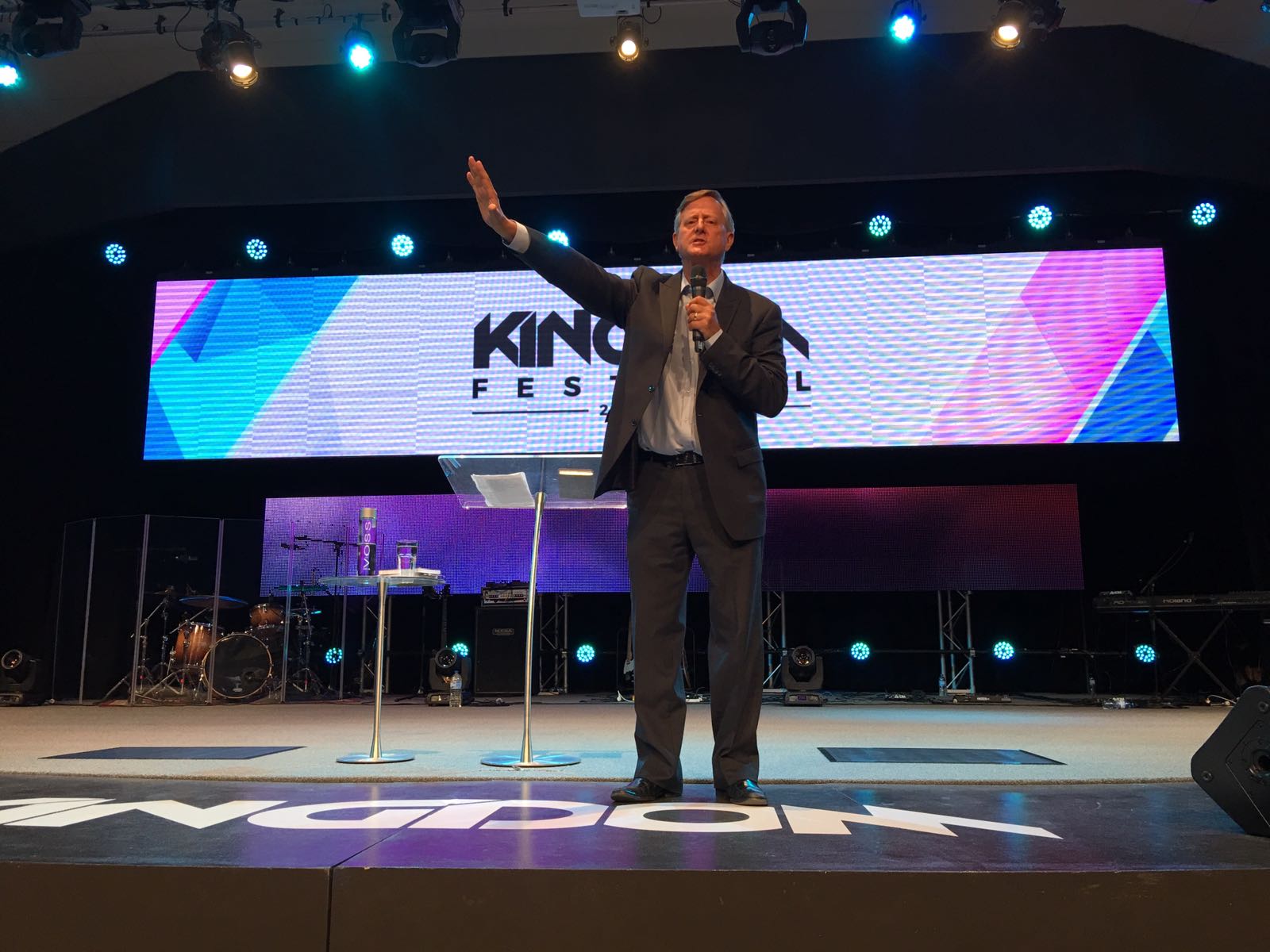“If God has infinite resources, why does He withhold riches?”: Pastor Craig Hill
by Janice Tai // November 5, 2021, 4:19 pm

Pastor Craig Hill, founder of Family Foundations International, speaking at the N5 (Nehemiah 5) conference.
There was a time when Pastor Craig Hill was ministering among the rural poor in Zimbabwe, Africa, and he started asking God why a God of infinite supply at His disposal would put constraints on His people’s resources.
Churches and ministries, he noticed, often have more vision and projects on hand than resources available to carry them out.
Is it because God is a withholder and does not want to release the finances? Ps Craig did not think so.
“So why, God?” he wondered.
In response, God gave Ps Craig a mental picture of an administrator in a huge snowfield directing meltwater down three different rivers. Along each river lived a different family. Each family had a different experience of how much water flowed down their river and a different perspective on how the water should be used.
It was an allegory of sorts on how Man’s stewardship of financial resources impacts divine provision.

Ps Craig Hill speaking and ministering at conferences around the world. The various Family Foundation International bases in different countries conduct over 2,500 marriage and family blessing weekend experiences each year.
Ps Craig shared the picture in his talk on “Living on the third river – keys to releasing financial resources” as part of the inaugural N5 conference that took place online on October 29 and 30.
Pastor Craig Hill is the founder of Family Foundations International and a leading expert on topics such as family, marriage and personal wealth management.
The N5 (Nehemiah 5) conference was organised with the aim of equipping believers to steward personal financial resources according to His Word and for kingdom purposes.
The hoarder at the first river
Here’s the experience of the family who lives by the first river:
There is just never quite enough water, no matter what we do. We are always short of water. There’s always a deficiency and because of the fear that we are just not going to have enough water.
So, we store all the water that comes down the river and no excess water will pass our house. We’d better accumulate any water that comes down as we may not have enough next year. In fact, let’s put a dam in the river so that any water that comes down the river can be pooled into a lake in front of our house.
“It doesn’t matter how much water you put down the first river or the second river, it isn’t going to serve anybody else.”
Our understanding of the purpose of water is for survival. Water that comes down our river is for us to survive.
Whenever the administrator up in that snowfield decides to double the quantity of meltwater coming down the first river, he finds that the extra water would not benefit anybody else.
Instead, the excess water creates a bigger and bigger lake in front of the family’s house.
Ps Craig said he has come across people who viewed their financial resources like the family living by the first river.
“I have a friend who had about $3 million in liquid assets and a bunch of other assets tied up in real estate properties that he owned,” said Ps Craig. “One day, his wife told him they needed to buy some new shoes and clothes for their four children because school was starting again. Without thinking, he said, ‘No, we can’t afford it.’
“I thought that was the strangest thing – that a man with $3 million in the bank could not afford to buy his children new clothes and new shoes.
“Why was that? That wasn’t rational. It didn’t make sense. It was an intense fear that he had in the depths of his heart, from his growing up years, that kept him and his family in bondage.
“It wouldn’t matter how much water came down his river, he would store it all.”
The user at the second river
Here’s the experience of the family who lives by the second river:
There is usually enough water for us but not really more than enough. Our goal is just to use all the water that comes down the river as the water is meant for us to use.
Whenever the administrator up into snowfield decides to double the quantity of water coming down, we then use more water for ourselves, such as planting grass and putting in a sprinkler system to water the grass in our property. If more water comes down the river, we would put in fountains and water features all over the grounds. If even more water comes down the river, we would build a swimming pool for our children. And if yet more water comes down the river, we would build an entire water park just for our family.
“If you were honest with yourselves, which river do you live on?”
The family on the first river sees the family on the second river and they wish they could be like them and have a waterpark as their dream is to have all those kinds of things.
“How much water passes by their house so that someone else down the river could use it? The answer is a little trickle but really almost nothing because they use all the water that comes down,” said Ps Craig.
“So, if you are the administrator, you can see it doesn’t matter how much water you put down the first river or the second river, it isn’t going to serve anybody else other than the families on each of those rivers,” said Ps Craig.
When he saw the mental picture that the Lord gave him, Ps Craig heard God say that He was the one who needed a financial breakthrough, not the people who were praying to Him for financial breakthroughs in their situations.
“I am trying to release water down these rivers and each of these families is like my conduit or pipeline, yet all the water is getting stuck. None of it is coming out at the other end. It doesn’t matter if I increase the volume of water, no more comes out at the other end,” he heard God say to him.
The visionary at the third river
Here’s the experience of the family who lives by the third river:
There is so much snow up there in the snowfield and so much water coming down. We could never use all the water that’s coming down our river.
Since we believe that the purpose of the water is to accomplish the vision that God gives us for it, we make decisions to decide how much water to allocate for ourselves. How much is enough? How much water are we supposed to use?
“Provision is that which comes from God for the purpose of accomplishing the vision.”
We do not worry about whether there is enough water for us or not because we know the administrator up in the snowfield. He is our brother and he likes us so he always makes sure there is enough water coming down our river.
We allow the rest of the water that is beyond the amount that we need for personal consumption to go on down the river for others. We notice there is a village where there’s no river and so we build a canal from our river to channel water to that village. We also aim to build three more channels before the end of the year to other villages that do not have any water.
We see an abundance of water coming down our river but we do not change the amount of water we use for ourselves as we have already decided how much water we will need.
“If you were honest with yourselves, which river do you live on?” Ps Craig asked his online audience at the N5 conference.
“How do we move from the first or second river to the third river? How do people on the third river think differently from the people on the first and second river?” he challenged listeners.
Becoming third-river investors
Ps Craig went on to share some biblical principles from his book, Five Wealth Secrets 96% of Us Don’t Know, that would change people’s financial situation as well as that of future generations.
Here is how we can move from the first and second rivers to the third river:
1. Pursue a vision, not money
The first aspect on how people on the third river think differently than people on the first river is that people on the third river never pursue money. They never pursue resource. They pursue vision. What people on the third river have realised is that provision always follows vision.
The people on the third river focus on vision with an expectation that provision will follow.
“Pro-vision is a two-part word. It begins with the pronoun ‘pro’, which means ‘for’ or ‘in favour of’,” said Ps Craig. So what is provision? Provision is that which comes from God for the purpose of accomplishing the vision.
“When there is no vision, the people perish (Proverbs 19:18). So many people are perishing,” added Ps Craig, “because they do not know what the vision is and they do not know what they are supposed to do. Instead, they are focused on provision without realising that provision comes from God to accomplish vision.”
The people on the third river focus on vision with an expectation that provision will follow. They understand that God has an infinite supply and He wants to release to His people the resources needed to accomplish the vision.
2. Have sparrow faith
Many people think provision comes from the model of sowing and reaping, said Ps Craig. If one sows, then one reaps. If one is in need, then one must give, because that is how provision and multiplication will come.
“Do you know that sowing and reaping is not Jesus’s model of provision? People on the third river understand this but the people in the first and second river do not,” asked Ps Craig.
“Provision comes for one reason only, because He loves us. Provision comes by God’s grace, not by our works.”
He noted that Jesus has a totally different model of provision, one that is described in Matthew 6:26: Look at the birds of the air; they do not sow or reap or store away in barns, and yet your heavenly Father feeds them. Are you not much more valuable than they?
“Jesus tells us that there are two things that birds do not do. They don’t sow and reap, and they don’t store or gather in barns,” pointed out Ps Craig. “I’m not saying sowing and reaping is not correct. I’m not saying saving is not correct. Those are great principles. What I’m saying is they’re not for the purpose of provision.”
What then is Jesus model of provision?
“The birds simply trust that God will make provision for them. God is telling us, ‘Son, you make everything about you. See, you make provision all about your works – about what you’re doing, about what you’re giving, about your working. It’s all about you.
“Provision comes for one reason only, because He loves us. Provision comes by God’s grace, not by our works,” he added.
Ps Craig calls this model of provision that of having “sparrow faith”.
“If you understand sparrow faith, you realise that God is more than willing to provide and he wants to give.
“Living on the third river requires you to have as much faith in God’s provision as the birds do.”
“Living on the third river requires you to have as much faith in God’s provision as the birds do. Have you ever seen a sparrow having an anxiety attack? Or not sleeping well at night?”
Ps Craig gave another analogy that Jesus himself uses to describe how the Father provides.
“Does your little five-year-old child lie awake at night wondering whether he will have food tomorrow? Probably not. Why? They know Dad and Mom will provide food even if they don’t know where it comes from, simply because they love him. Even on the naughtiest day of your little son’s life, he won’t be denied food and clothing and shelter. If you treat your own children that way, how much more will God treat you that way? People living on a third river naturally understand that,” he said.
He urged people who are having trouble sleeping at night, or dealing with fears and anxieties such as “What if I get the virus? What if the economy gets locked down? What if my business is shut down?” to go and look out the window.
“If the birds are still there, know that you are going to be okay.”
Look out next week for more biblical principles and tips on financial wisdom and management from Pastor Craig Hill, in our next story, “Top 3 biblical wealth secrets all parents need to teach their children”.
Find out more on Family Foundations Singapore here.
RELATED STORIES:
We are an independent, non-profit organisation that relies on the generosity of our readers, such as yourself, to continue serving the kingdom. Every dollar donated goes directly back into our editorial coverage.
Would you consider partnering with us in our kingdom work by supporting us financially, either as a one-off donation, or a recurring pledge?
Support Salt&Light


